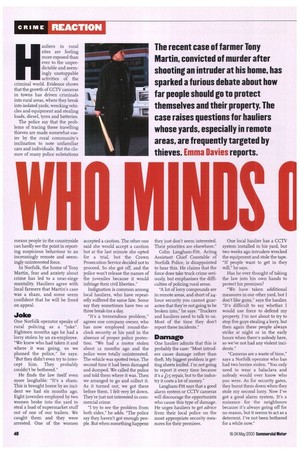VI HO MIN
Page 42

If you've noticed an error in this article please click here to report it so we can fix it.
Hauliers in rural sites are feeling more exposed than ever to the unpredictable and seemingly unstoppable activities of the criminal world. Evidence shows that the growth of CCTV cameras in towns has driven criminals into rural areas, where they break into isolated yards, wrecking vehicles and equipment and stealing loads, diesel, tyres and batteries.
The police say that the problems of tracing these travelling thieves are made somewhat easier by the rural community's inclination to note unfamiliar cars and individuals. But the closure of many police substations means people in the countryside can hardly see the point in reporting suspicious behaviour to an increasingly remote and seemingly uninterested force.
In Norfolk, the home of Tony Martin, fear and anxiety about crime has led to a near-siege mentality. Hauliers agree with local farmers that Martin's case was a sham, and some seem confident that he will be freed on appeal.
Joke
One Norfolk operator speaks of rural policing as a "joke". Eighteen months ago he had a lorry stolen by an ex-employee. "We knew who had taken it and where it was going, so we phoned the police," he says. "But they didn't even try to intercept him. They probably couldn't be bothered."
He finds the law itself even more laughable: "It's a sham. This is brought home by an incident we had six months ago. Eight juveniles employed by two women broke into the yard to steal a load of supermarket stuff out of one of our trailers. We caught them and they were arrested. One of the women accepted a caution. The other one said she would accept a caution but at the last minute she opted for a trial, but the Crown Prosecution Service decided not to proceed. So she got off, and the police won't release the names of the juveniles because it would infringe their civil liberties."
Indignation is common among local hauliers, who have repeatedly suffered the same fate. Some say they sometimes have two or three break-ins a day.
"It's a tremendous problem," agrees one company owner, who has now employed round-theclock security at his yard in the absence of proper police protection. "We had a motor stolen about 12 months ago and the police were totally uninterested. The vehicle was spotted twice. The second time it had been damaged and dumped. We called the police and told them where it was. Then we arranged to go and collect it. As it turned out, we got there before them. I felt very let down. They're just not interested in commercial crime.
"I try to see the problem from both sides," he adds. The police say they haven't got enough people. But when something happens they just don't seem interested. Their priorities are elsewhere."
Cohn Langham-Fitt, Acting Assistant Chief Constable of Norfolk Police, is disappointed to hear this. He claims that the force does take truck crime seriously, but emphasises the difficulties of policing rural areas.
"A lot of lorry compounds are in remote areas, and short ofhour security you cannot guarantee that they're not going to be broken into," he says. "Truckers and hauliers need to talk to us. Most of the time they don't report these incidents."
Damage
One haulier admits that this is probably the case: "Most intruders cause damage rather than theft. My biggest problem is getting sheets knifed. I'm not going to report it every time because it's a Lis repair, but to the industry it costs a lot of money."
Langham-Fitt says that a good alarm system or CCTV cameras will discourage the opportunists who cause this type of damage. He urges hauliers to get advice from their local police on the most appropriate security measures for their premises.
One local haulier has a CCTV system installed in his yard, but two weeks ago intruders wrecked the equipment and stole the tape. "If people want to get in they will," he says.
Has he ever thought of taking the law into his own hands to protect his premises?
"We have taken additional measures in our other yard, but I don't like guns," says the haulier. "It's difficult to say whether I would use force to defend my property. I'm not about to try to stop five guys stealing a lorry, but then again these people always strike at night or in the early hours when there's nobody here, so we've not had any violent incidents."
"Cameras are a waste of time," says a Norfolk operator who has had two lorries stolen. "You only need to wear a balaclava and nobody would ever know who you were. As for security gates, they burnt them down when they stole my second lorry. Now I've got a good alarm system. It's a nuisance for the neighbours because it's always going off for no reason, but it seems to act as a deterrent. I've not been bothered for a while now."








































































































